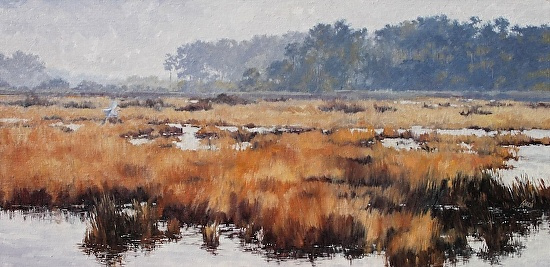
Mysteries of Survival
 By: V. Paul Reynolds
By: V. Paul Reynolds
In America today, a once respectable word has taken on negative connotations. The term “survivalist,” to the average contemporary news consumer, conjures a vision of a bearded, wild-eyed anarchist who shoots at FBI agents from his mountain cabin. Yet, there are other kinds of survivalists.
From mountain climbers and deep divers to corporate titans, most of them are respectable. To one extent or another, anyone who is an adventurist, who gets off the beaten path to face nature on its own terms is a survivalist. Most serious deer hunters are survivalists.
Those of us who spend any time in the big woods know there is always that chance of, as they say, “getting turned around” or lost. Even if they have never had to spend a night in the woods, most hunters have known that uncomfortable feeling of not being sure where you are or how best to get back to the truck. The wise hunter prepares for the contingency.
They carry a survival pack containing the bare essentials to get by if the worst happens. Sporting goods companies market survival gadgets, from radio locator transmitters to space blankets and energy bars. Hunting safety instructors lecture newcomers about the need to be prepared and the kind of gear to carry.
Aspiring new hunters are repeatedly subjected to this refrain, “Admit you are lost and stay put. Start a fire. Someone will find you.”
This is all well and good. There is, however, another element of surviving woods shock that is crucial, yet, rarely is discussed, the psychology of survival. Author and adventurer Laurence Gonzales examine the psychology of survival and risk-taking in a fascinating book titled “Deep Survival.”
He delves into the mysteries of survival and addresses contradictions you will find if you start reviewing survival stories. For example, why is it that a perfectly healthy, strong deer hunter can perish after one night in the woods while a 4-year-old child can survive the same woods for a week under similar conditions? What about that December deer hunter in Western Maine last fall?
He wandered for a couple of days in the cold and snow. He fell through the ice. He didn’t know how to use his GPS effectively. In short, he violated every survival rule in the book, yet, he lived to tell about it.
Gonzales writes, “A survival situation is a ticking clock: You only have so much stored energy and water. Every time you exert yourself, you’re using it up. The trick is to become extremely stingy with your scarce resources. Balancing risk and reward, investing only in efforts that offer the biggest return.”
Gonzales maintains that people who perish in the woods die from confusion, or what he calls woods shock. He contends there is more to surviving than what you have in your survival pack, or even how much training you have had. He claims these things, the cell phone or what have you, can betray you.
“At the moment of truth,” he writes, “those might be good things to have but they aren’t decisive.”
So, mental preparation, as well as survival gear, equals survival, some of the time. There is yet another dimension.
“It’s not what’s in your pack that separates the quick from the dead. It’s not even what’s in your mind. Corny as it sounds, it’s what’s in your heart,” asserts Gonzales.
For example, Gonzales recounts real-life survival ordeals of people adrift in lifeboats. All aboard were dehydrated, starved, and desperate. Some lived, some died.
The ones who went first “gave up” before their bodies did. There was a sort of spiritual collapse. By contrast, a solo Atlantic sailor managed to survive for months adrift by saving and rationing rainwater and catching an occasional fish.
He finally drifted into a shipping lane. Upon being discovered, he told his would-be rescuers not to hurry. He was “fine.” Some of us are born survivors, and some are not. Which are you?
For more articles about survival, be sure to read Basics of Survival monthly in the Northwoods Sporting Journal, the most comprehensive sporting magazine in the Northeast.

 By: V. Paul Reynolds
By: V. Paul Reynolds